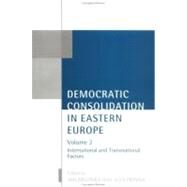Democratic Consolidation in Eastern Europe Volume 2: International and Transnational Factors
, by Zielonka, Jan; Pravda, Alex- ISBN: 9780199244096 | 019924409X
- Cover: Paperback
- Copyright: 8/16/2001
This is the second volume in a two-volume series of books on democratic consolidation in Eastern Europe. The first volume focused on the issue of institutional engineering. This second volume analyses the external parameters of democratic consolidation in thirteen Eastern European countries:how different international actors and various economic, cultural and security types of transnational pressures have shaped democratic politics in the region. The aim is to contrast a set of democracy theories with empirical evidence accumulated in Eastern Europe over the last ten years. The volume tries to avoid complex debates about definitions, methods and the uses and misuses of comparative research. Instead it seeks to establish what has reallyhappened in the region, and which of the existing theories are helpful in explaining these developments. The volume is divided into two parts. The first part presents a conceptual and comparative frame of analysis, the second consists of detailed studies of individual countries undergoing democratic consolidation. Case study chapters deal with the following countries: Estonia and Latvia, Hungary,Poland, the Czech Republic, Slovakia, Romania, Bulgaria and Macedonia, the states of former Yugoslavia, Belarus and Ukraine, and finally Russia. The concluding chapter identifies a set of variables responsible for the enormous impact of external factors on democratic consolidation in Eastern Europe.It conceptualises the interplay of internal and external factors impinging upon democracy, and shows the interplay of different positive and negative types of external pressures. It also evaluates the conscious Western effort to craft or engineer democracy in Eastern Europe.







